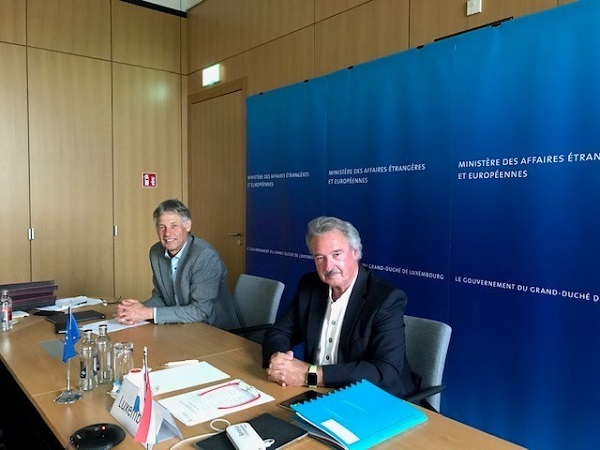 L-R: Henri Kox, Minister Delegate of Internal Security; Jean Asselborn, Minister of Foreign and European Affairs;
Credit: MAEE
L-R: Henri Kox, Minister Delegate of Internal Security; Jean Asselborn, Minister of Foreign and European Affairs;
Credit: MAEE
Luxembourg's Minister of Foreign and European Affairs Jean Asselborn and Minister Delegate of Internal Security Henri Kox participated in yesterday's video conference of European Union (EU) Home Affairs Ministers.
The video conference allowed EU ministers responsible for home affairs to discuss the state of play and way forward in the response to the COVID-19 pandemic in the area of home affairs.
Firstly, the ministers addressed questions relating to the management of the EU's internal and external borders with a view to guaranteeing the functioning of the internal market and the free movement of goods and people. In this regard, Jean Asselborn recalled that thousands of cross-border workers travel to Luxembourg every day without this having accelerated the spread of the virus. Minister Asselborn thus advocated a gradual lifting of internal border controls. Such a phased approach should include several elements, including the gradual replacement of systematic checks with non-systematic checks and the extension of the concept of "authorised journeys".
The EU home affairs ministers also discussed the various means of preventing the spread of the virus, particularly through the possible use of tracking applications. Ministers debated the need to respect EU standards for the protection of personal data and to limit the intrusiveness of the device. Furthermore, these applications should only be used for specifically defined purposes and should in no case be used as a means of mass surveillance. They should also guarantee users control of their data and the possibility of using such applications on a voluntary basis.
For Luxembourg, a series of backups will therefore be necessary to arrive at the least intrusive solutions and to guarantee data security. Interoperability should also be guaranteed between the solutions of the different EU Member States and therefore cross-border use. Luxembourg finally underlined that such an application could only be one tool among a package of health measures coordinated at the EU level, such as screening tests, social distancing and wearing masks, rather than sacrificing the free movement of citizens.
In addition, the video conference was an opportunity for the ministers to take stock of issues related to the impact of COVID-19 on EU asylum procedures. In this context, Minister Asselborn affirmed that Luxembourg is implementing the guidelines which were adopted by the European Commission on 16 April 2020 and whose objective is to ensure as much as possible the continuity of procedures while protecting human health and fundamental rights. As for the Dublin regulation, he recalled Luxembourg's opinion that suspensions decided by the Member States should be temporary.
The ministers also discussed the development and trends observed in organised crime in the context of the COVID-19 crisis. In order to launch this debate, the Croatian Presidency relied in particular on information provided by the Europol agency, which draws up regular reports on the aspects of organised crime and terrorism on the basis of information provided by the Member States as well as through open sources to be distributed to the Member States and partner countries. According to the latest agency report, criminals are trying to take advantage of the current situation to speed up their illicit activities, for example in the area of cybercrime. Europol therefore asked the competent authorities not to lower their guard in the fight against disinformation.
Finally, the video conference allowed the European Commission, the European External Action Service and the ministers of the countries most affected by migration issues to inform the EU ministers of the current challenges in this domain. Thus, an inventory of the current situation was drawn up, particularly with regard to the situation on the borders with Turkey, in the western and central Mediterranean as well as the relocation of unaccompanied minors from Greece








